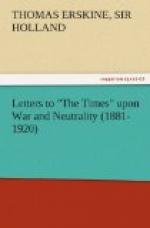Four years ago we stood on the brink of war without the people knowing it and without any preparation or effort at preparation for the impending peril. I did all that in honor could be done to avert the war, but without avail. It became inevitable; and the Congress at its first regular session, without party division, provided money in anticipation of the crisis and in preparation to meet it. It came. The result was signally favorable to American arms and in the highest degree honorable to the Government. It imposed upon us obligations from which we cannot escape and from which it would be dishonorable to seek escape. We are now at peace with the world, and it is my fervent prayer that if differences arise between us and other powers they may be settled by peaceful arbitration and that hereafter we may be spared the horrors of war.
Intrusted by the people for a second time with the office of President, I enter upon its administration appreciating the great responsibilities which attach to this renewed honor and commission, promising unreserved devotion on my part to their faithful discharge and reverently invoking for my guidance the direction and favor of Almighty God. I should shrink from the duties this day assumed if I did not feel that in their performance I should have the co-operation of the wise and patriotic men of all parties. It encourages me for the great task which I now undertake to believe that those who voluntarily committed to me the trust imposed upon the Chief Executive of the Republic will give to me generous support in my duties to “preserve, protect, and defend, the Constitution of the United States” and to “care that the laws be faithfully executed.” The national purpose is indicated through a national election. It is the constitutional method of ascertaining the public will. When once it is registered it is a law to us all, and faithful observance should follow its decrees.
Strong hearts and helpful hands are needed, and, fortunately, we have them in every part of our beloved country. We are reunited. Sectionalism has disappeared. Division on public questions can no longer be traced by the war maps of 1861. These old differences less and less disturb the judgment. Existing problems demand the thought and quicken the conscience of the country, and the responsibility for their presence, as well as for their righteous settlement, rests upon us all—no more upon me than upon you. There are some national questions in the solution of which patriotism should exclude partisanship. Magnifying their difficulties will not take them off our hands nor facilitate their adjustment. Distrust of the capacity, integrity, and high purposes of the American people will not be an inspiring theme for future political contests. Dark pictures and gloomy forebodings are worse than useless. These only becloud, they do not help to point the way of safety and honor. “Hope maketh not ashamed.” The prophets of evil were not the builders of the




